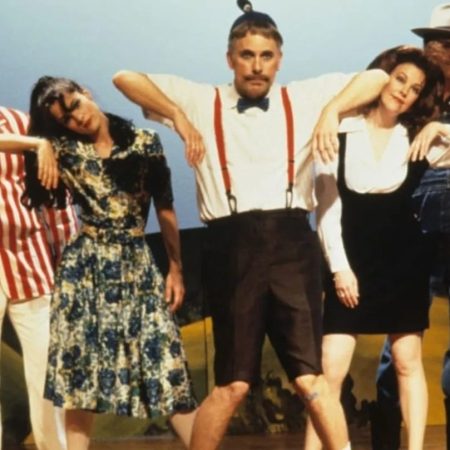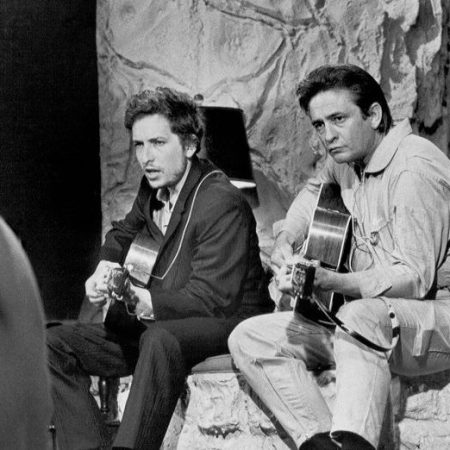It’s been a huge and exhausting several months for music biopics. Maestro, Bradley Cooper’s effortful depiction of Leonard Bernstein, recently earned seven Oscar nominations including Best Picture; Sofia Coppola’s Priscilla relaunched a dialogue around Elvis Presley’s legacy as an artist and husband; One Love, the new Bob Marley film starring Kingsley Ben-Adir, has been outperforming box office predictions; and just recently, Sony Pictures Entertainment announced a four-part series of biopics that will follow each individual member of The Beatles.
But perhaps all these movies will be overshadowed by a celebration of one of the most consequential music films of all time — even if that film is about a band that never actually existed.
This March marks the 40th anniversary of This is Spinal Tap, the Rob Reiner-directed mockumentary about “one of England’s loudest bands.” The film documents the fictional rock group Spinal Tap and their attempts to promote their new album, Smell The Glove. Mimicking the cinéma vérité style showcased in documentaries like Martin Scorcese’s The Last Waltz, This is Spinal Tap follows the eponymous band through their many failures, successes and drummers (who consistently and inconsequentially die under increasingly goofy circumstances). There are monstrous wigs, malfunctioning setpieces and, of course, some of the most absurd songs one could ever bang their head to. Despite originally underwhelming in the box office, the film has not only become a cult classic, it’s been hailed as one of the most impactful satires in movie history. Last November, Reiner announced that a sequel is in the works, one that will feature the original cast as well as music legends like Garth Brooks and Paul McCartney. The frenzied response that followed this announcement is a testament to how impactful this movie has been to comedy lovers everywhere. However, This is Spinal Tap is not only an important landmark in satire, it’s also an important landmark in films about music.
Since the release of This is Spinal Tap, there has been no shortage of films satirizing musical biopics and documentaries. These have ranged from Lonely Island’s Popstar: Never Stop Never Stopping — which lampooned the self-produced, “tell-all” documentaries by pop stars like Justin Bieber — to the surprisingly hilarious Weird, the pseudo-biopic of Weird Al Yankovic. These films are intended to make fun of the cliches that “real” music films too often rely upon. However, as a result, they often end up being a more loving homage to the joy and power of music than the films that actually took themselves seriously.
As a professional cultural writer with a Bachelor’s degree in music, I’ve often been asked what my favorite music film is. My answer is usually the 2007 comedy Walk Hard: The Dewey Cox Story, the mock-biopic that parodies films like Ray and Walk the Line. I used to give this answer as a troll, but the truth is that amongst all the paint-by-numbers music biopics, flat musical adaptations and self-produced, faux-vulnerable documentaries that have come out in recent years, none of them are as lovingly or thoughtfully rendered as the John C. Reilly-led comedy. It’s a movie that perhaps would not exist were it not for the groundwork Spinal Tap laid almost two decades prior.
Like This is Spinal Tap, Walk Hard is a movie astutely aware of the genre it’s parodying. It knows that few films have more formulaic tendencies than music biopics. In fairness, these formulas are in place to help with the impossible task of cramming an entire life story into a marketable two-to-three-hour piece of entertainment, all while making sure to leave room for the tunes that movie-goers of all ages know and love. What makes satires like Spinal Tap and Walk Hard so brilliant is that they get to have their cake and eat it too: they avail themselves of every lazy trope traditional music films have to offer and then sidestep it by pointing and laughing at it. Walk Hard opens with an aged-up John C. Reilly wistfully leaning against a backstage wall before a performance of a lifetime. Tim Meadows’s character explains that Dewey Cox “has to think about his whole life before playing,” leading to a flashback that covers the impossibly full and action-packed life of the make-believe icon. It’s a convenient framing device about which the writers of the film seem to ask “haven’t we seen this one too many times?” I defy you to watch films like 2018’s Bohemian Rhapsody and not cringe at every single one of these overused shortcuts that Walk Hard so delightfully calls out.
Ric Parnell, Spinal Tap Drummer, Dead at 70
“No one ever rocked harder,” said Harry ShearerSpinal Tap opens on a similar note. Rob Reiner’s character, the director Martin “Marty” Di Bergi, explains how he met the band at New York’s Electric Banana (“Don’t look for it, it’s not there anymore”), and was inspired by their “promptness” to make a documentary about them. It’s a needless and self-aggrandizing way to open a film, and that’s the point. It perfectly sets the tone for the rest of the movie; you know exactly what kind of band you’re about to follow, the sort of movie that’s being referenced, and how this film plans on skewing it all.
One advantage a film like Spinal Tap has over a film like, say, the 2022 biopic Elvis, is that the former at least gets to tout original music. It’s one thing to faithfully regurgitate Elvis music; it’s a whole other endeavor to write brand new songs that somehow get straight to the heart of what larger-than-life stars like Elvis were doing at the peak of their powers. And sure, this music may border on juvenile, but in between the innuendos and broad comedic gestures lies a thoughtful study of the music they’re parodying. If you ignore the lyrics, you can listen to Spinal Tap songs like “Big Bottom” or “Gimme Some Money” and convince yourself they’re real. Same goes for songs like “Guilty as Charged” from Walk Hard, “I’m So Humble” from Lonely Island’s Popstar: Never Stop Never Stopping, or “Catalina Breeze” from the stunning Documentary Now episode “Gentle and Soft: The Story of the Blue Jean Committee.” These songs are send-ups, but they’re also written, arranged and mixed with a specificity that betrays a deep love and understanding of the eras and genres they traffic in.
And that is why these movies are often a more fitting tribute to music than the films they’re satirizing. To take down every ridiculous detail of traditional music films, you first have to be enamored with them. In Walk Hard, you can hear the care that went into trying to capture the magic of Johnny Cash, or feel the fervor of former theater geeks in recent films like Dicks: The Musical and the deceptively uplifting mockumentary Theater Camp, or see the attention to detail in the guitar fingering featured on This is Spinal Tap. What makes these movies so effective is that they are made for music nerds by music nerds. Their love for music isn’t literalized on screen; it’s felt in the tiny but hilarious nuances that could only come from someone who truly appreciates the art they’re lampooning. It’s easy to watch these films and think that they’re making fun of rockstars. But really they’re making fun of the people who insist on taking the inspiring and complicated legacies of music’s greatest icons and flattening them.
Future documentaries and biopics about beloved musicians will continue to achieve mainstream success. They will use obvious framing devices, obscure the truth about the songwriting process and leave out important context regarding their subjects’ history and identity. And yes, they may offer some intriguing insights for people who don’t have a deep pre-existing knowledge of the artist; and yes, the lead performers will receive press and praise for the ways in which they bent over backwards to embody their character; and yes, some may even be worthy of Oscars. However, few of them will offer their audience something that can’t be found via an album-listening and a Wikipedia scroll. Films like This is Spinal Tap offer something totally different. The stories may be fake, the songs absurd, and the satire biting, but the utterly original way they express their love for music is something beyond what any traditional film could ever max out at. They take it all the way to 11.
This article appeared in an InsideHook newsletter. Sign up for free to get more on travel, wellness, style, drinking, and culture.


























